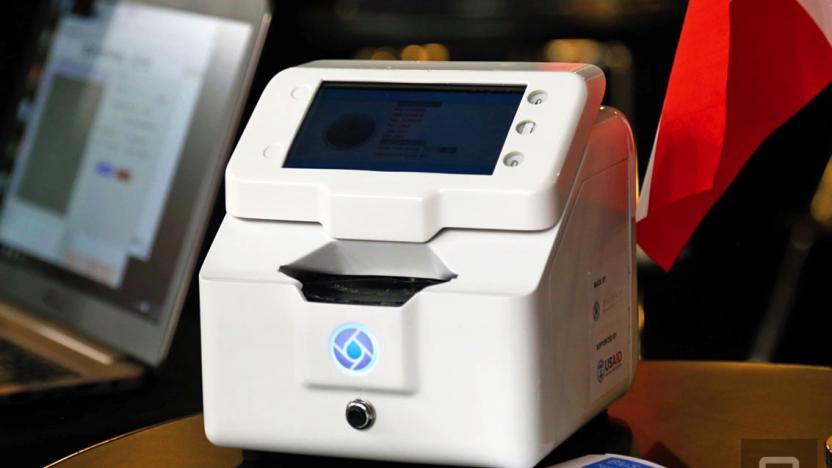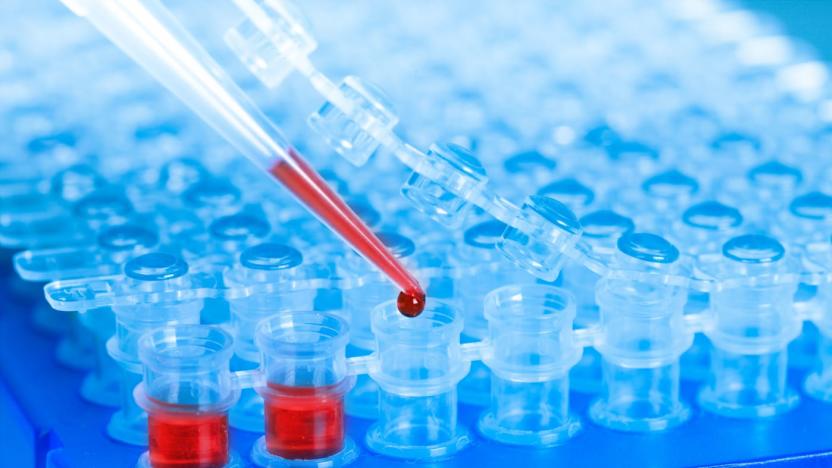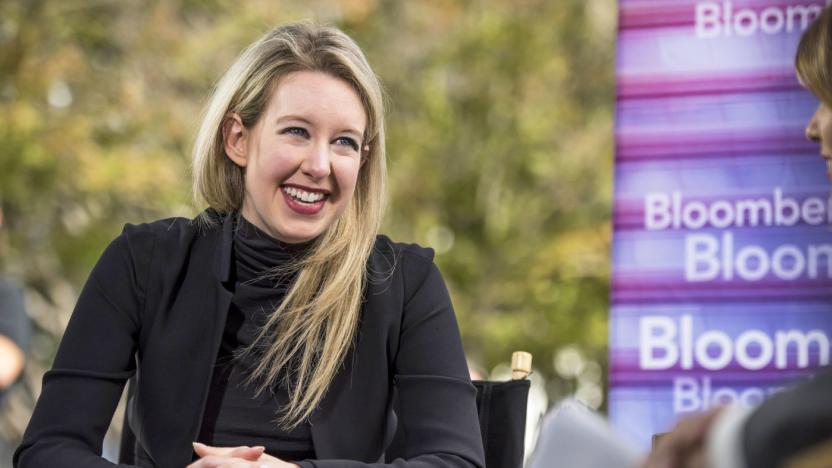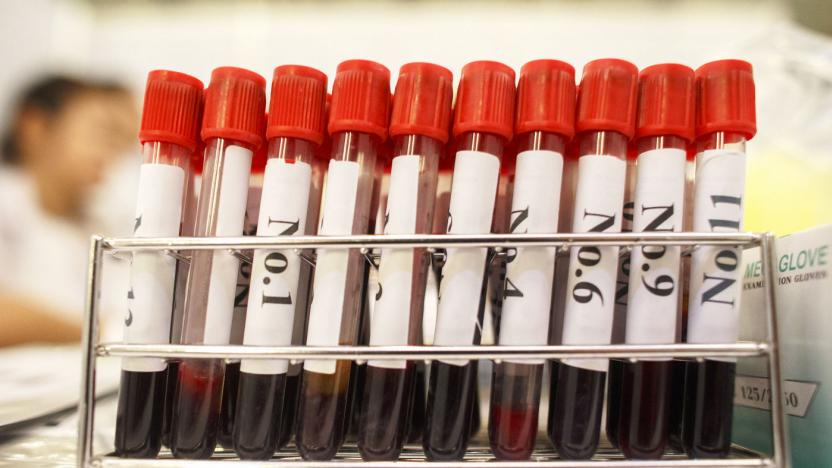BloodTest
Latest

DNAFit's at-home blood test wrote my 2019 resolutions for me
What do you get the amateur athlete who already bought the fancy shoes, had their gait analyzed and owns a too-tight triathlon onesie? Genetic testing, of course. It's in this field that weekend warriors are now looking for ways to shave seconds from their times. Peeping at your genes can only tell you so much, which is why companies like DNAFit are expanding.

Study backs blood test that gauges seriousness of concussions
Remember how the FDA approved a blood test that could determine the severity of a concussion? It's now clear just why the FDA gave its approval. The Lancet Neurology has published the study at the heart of the decision, giving you a chance to verify the claims for yourself (if you're willing to pay, at least). As before, Banyan Biomarkers' test checks for the presence of two brain proteins (GFAP and UCH-L1) whose levels rise when there are signs of internal trauma. The FDA's claims check out -- out of 1,959 eligible test subjects, just three had CT scans turn up results when the blood tests were negative.

FDA approves blood test that determines severity of concussions
The FDA announced this week that it has approved a blood test that can quickly and reliably detect signs of a concussion. Typically, when someone seeks medical care following a head injury, they're subjected to a neurological test and/or a CT scan. However, CT scans can only detect bleeding or swelling in the brain, and for injuries that are more minor but still serious, those scans aren't terribly useful. Additionally, if CT scans don't spot anything, and in many cases they don't, the person undergoing the scan has been subjected to unnecessary radiation and, usually, an unneeded expense.

Theranos avoids bankruptcy thanks to a last-minute loan
Theranos has come a long way from the days when it was a darling in the biotech industry. The Wall Street Journal's sources have claimed that the blood-testing firm has avoided bankruptcy by securing a $100 million loan from Fortress Investment Group. The move should keep Theranos afloat "through 2018," founder Elizabeth Holmes reportedly said in an email. Naturally, though, there are strings attached -- Fortress wants to see a return on its investment.

Zika test needs just a drop of blood
At this point, the idea that you could use a drop of blood, taken from your finger, to test for disease is pretty played out. After all, a certain company has spent the last year or so burning up any remaining goodwill for the technology. Despite this, a Danish-Taiwanese company called BluSense Diagnostics claims that it has developed a tiny box that can test for both dengue fever and the Zika virus with a single drop of finger blood.

Theranos settlement means it could have a lab again in 2019
Theranos has been headed toward disaster for a while through its questonable blood testing methods, but it might have just avoided the worst possible outcome. The biotech outfit has reached a settlement with the Centers for Medicare & Medicaid Services that should end the legal and regulatory fights between the two. In return for Theranos dropping appeals of both its 2-year lab ban and sanctions on its Newark lab, CMS has decided against revoking Theranos' Clinical Laboratory Improvement Amendments (CLIA) certificates and reducing the civil financial penalty to $30,000. Theranos is voluntarily giving up the certificates, as it's not running labs that would need them.

Trump defense secretary pick serves on Theranos' board
President-elect Trump's rapidly growing circle of advisers and cabinet members continues to raise eyebrows among the tech-savvy. The incoming leader has picked retired General James Mattis as his Secretary of Defense, and the Marine has been a devoted champion of Theranos -- you know, the blood testing firm facing both a criminal investigation and a slew of lawsuits over its technology claims. He's on the company's board of directors, but email obtained by the Washington Post shows that Mattis bent over backwards to support Theranos in the years when he was leading US Central Command.

Walgreens sues Theranos for a reported $140 million
Walgreens is taking Theranos to court for $140 million, according to Wall Street Journal investigative reporter John Carreyrou and a motion filed today in Delaware district court. The details of the case are secret, as the companies both signed non-disclosure agreements that could be violated if Walgreens' actual complaint were made public.

WSJ: Theranos is voiding and revising past blood test results
As Theranos faces increased scrutiny from regulators, tonight the Wall Street Journal is reporting the company is taking an extraordinary step by voiding its own blood test results going back two years. According to the Journal, the company is telling the Centers for Medicare and Medicaid Services that it has issued "tens of thousands" of corrected blood test reports, covering results that have been revised or voided altogether.

Art school grads use tech to tackle big issues
Brooklyn's Pratt Institute might be well known for its engineering and arts courses, but for students in its industrial design program, it's about more than making something pretty and earning a degree. The ethos of the curriculum includes "trying to solve problems of poverty, hunger, energy, health, and other troubling issues of the disadvantaged world population by design." Indeed, that philosophy was on full display at this year's graduate student showcase.

Theranos loses its COO as it seeks to improve quality
What can Theranos do to restore confidence in its company and the suddenly-in-doubt finger prick blood tests it hoped would revolutionize the industry? It's hard to say, but tonight it's trying to turn things around by announcing some executive reshuffling. COO and president Sunny Balwani (who, along with CEO and founder Elizabeth Holmes is reportedly facing a ban from the blood testing industry) will retire.

Australian researchers developed a blood test for Parkinson's
By the time Parkinson's disease makes itself known in humans, it's already too late for treatment. But La Trobe University in Australia has developed a test that detects a biomarker present in blood cells in folks with the disease. The school describes the test as a means of detecting problems within cell mitochondria that cause an energy-and-stress-sensing protein, dubbed AMPK, to permanently activate and start damaging cells.

Theranos lab failed to meet its own accuracy standards
Theranos' proprietary blood-testing methods failed to meet the company's own standards as often as 87 percent of the time, according to a new report. Released by the CMS (Centers for Medicare and Medicaid Services) agency and seen in unredacted form by the WSJ, the data confirms that the company knew its finger pin-prick tests were often wrong when it used them in October, 2014. It has since pulled most of the testing done by its key "Edison" machine and can only perform a single herpes test. However, the FDA and CMS received complaints from Theranos employees that even that one was "tainted by breaches in research protocol."

Theranos blood test tech supposedly went unchecked for years
The saga of startup lab Theranos continues to get increasingly complicated. The firm, known for its proprietary tests that only need a finger-prick's worth of blood for analysis, has recently faced accusations that its technology was faulty and inaccurate. Now, it seems that its tech was not properly vetted by federal authorities for nearly two years. The Verge has learned that when the Centers for Medicare and Medicaid Services (CMS) inspected Theranos, it made no mention of the Edison machines -- Theranos' blood analyzers -- at all. The reason? Because it never inspected them.

WSJ: Walgreens is waiting for answers about Theranos blood tests
Controversy has swirled around Silicon Valley startup Theranos ever since the Wall Street Journal reported the company has struggled to roll out its unique blood testing technology. Since 2013 Walgreens has partnered with Theranos to use it for blood testing in the Phoenix area, but now the Journal says the drugstore chain is looking for answers too. It claims that Walgreens found out from the reports that Theranos had stopped using its tiny "nanotainers" to collect blood for all but one type of test. In a statement provided to Engadget (you can read it in full after the break), Walgreens says "we are currently in discussions about the next phase of our relationship" and that the two are trying to figure out a mutually beneficial arrangement. Meanwhile, Theranos has maintained it is confident in the accuracy of its tests, and says that by being faster and cheaper they can identify health problems earlier.

Walgreens to offer affordable and needle-free blood tests in more stores (updated)
You might still think of Walgreens as a corner drugstore chain, but the company aims to be much more than that. In its quest to become a "healthcare leader," Walgreens recently teamed up with Silicon Valley startup Theranos, which boasts a new and innovative blood testing method developed by founder Elizabeth Holmes (above). In fact, a Walgreens in Palo Alto started offering blood tests from within its premises last year, followed by over 40 stores in Phoenix. Now, according to Walgreens exec Tim Theriault, the company could eventually offer this in-store blood test in locations across the country-- a move that has huge implications, as Theranos' tests are much cheaper, quicker to do and a lot more efficient than its more traditional counterparts.

New blood test is an early warning system for Alzheimer's disease
Of all the tragic things that come with Alzheimer's disease, its tendency to sneak up on people is one of the toughest to deal with. That's because by the time the condition is even detectable, there's a good chance it's already too late to turn back the tide. Earlier diagnoses could mean the difference between years of mental decline and a life of relative normalcy -- that's why a test developed by researchers at King's College London and Oxford University could be such a game changer. According to The Telegraph, the scientists can predict whether or not Alzheimer's will strike someone with existing memory loss problems by looking for 10 telltale proteins in their blood.

Sharp Labs Europe develops portable microfluidic chip that completes blood tests in minutes
In partnership with the University of Southampton, Sharp Labs Europe is developing a mobile lab-on-a-chip that spits out results in minutes, potentially putting the test result waiting game to an end. Using microelectronics found in LCDs, the programmable microfluidic square splits microliters of blood -- and potentially other fluids -- into smaller droplets which it subjects to controlled chemical reactions. A single blood sample can be used for multiple tests, so there's no need to endure a barrage of pricks. Folks anxious for snappier lab results may need to sit tight, however, as it could be five to ten years before the device settles into your doctor's office. In the meantime, head past the break to get the scientific lowdown from Sharp Research Supervisor Ben Hadwen.

Scientists separate plasma from blood with working biochip
Disposable biotech sensors won't let you diagnose your own diseases quite yet, but we've taken the first step -- a research team spanning three universities has successfully prototyped a lab-on-a-chip. Called the Self-powered Integrated Microfluidic Blood Analysis System (or SIMBAS for short, thankfully), the device takes a single drop of blood and separates the cells from the plasma. There's no electricity, mechanics or chemical reactions needed here, just the work of gravity to pull the fluid through the tiny trenches and grooves, and it can take as little as ten minutes to produce a useful result. It's just the first of a projected series of devices to make malady detection fast, affordable and portable. Diagram after the break!

Lab-on-a-chip aims to take suspense out of blood work
If your doctor's ever uttered the words, "I'd like to run more tests," you know the wait for results can be torturous. Engineers and students at the University of Rhode Island (URI) are hoping to stop the torture with a new lab-on-a-chip technology that cuts way back on the wait for important lab results. The system provides results in 30 minutes, using a portable device and just a drop of blood. The blood is placed on a small plastic polymer cartridge, smaller than a credit card, and inserted into a shoebox-sized biosensor. It then travels across the cartridge to a detection site where reagents enable the sensor to detect biomarkers of disease. Basically, your doctor pops a bloody piece of plastic into a box, and out come your results. The first cartridges were developed to assess the risk of heart disease, but researches suggest they could be designed to detect everything from HIV to Alzheimer's. The URI team estimates costs at $3200 for the sensor and $1.50 for the test. No official word on a release date, but we hope they won't make us wait too long -- we can't stand the suspense.












